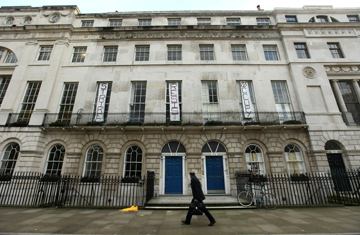
A man walks past two adjoining houses owned by film director Guy Ritchie in the Fitzrovia area of London on Feb. 14, 2011, the day squatters moved into the mansion
Last August, Kayne Manning and his fiancée were days away from moving into their first home on the outskirts of London when their lives suddenly took a turn for the absurd. Their estate agent called to tell them that at least two squatters had moved into the house that Manning had recently purchased and were claiming the property as their own. Manning held the deed to the property, but thanks to Britain's arcane squatting law, he was powerless to kick them out. "We went to see a solicitor who told us we needed a possession order from a barrister, and it would take several weeks and a few thousand pounds in fees to get the squatters out," he says. "The whole thing was surreal — it was our house!"
Cases like Manning's are not unusual in Britain, a country with peculiarly generous laws protecting the rights of inhabitants of vacant homes. London's newspapers regularly carry stories of homeless people, students or artists taking over posh London properties — on Monday, a gang of squatters made headlines by moving into a multimillion-dollar mansion owned by British filmmaker Guy Ritchie while it was being renovated. The group delighted the tabloids by setting up classes in tarot reading and poetry, posting their exploits on Twitter and releasing a video shot inside the home of Madonna's ex-husband.
To those who find their homes occupied by complete strangers, there are few legal options for removing squatters other than taking them to court. Under the Criminal Law Act 1977, squatters cannot be charged with breaking and entering if a building is left unsecured, and they can only be prosecuted for trespassing if they refuse police orders to leave. But many police forces view the removal of squatters as a civil matter and refer victims to the courts. As a result, homeowners such as Manning and Ritchie often find themselves in protracted legal disputes that take weeks and thousands of dollars to resolve, while squatters enjoy the property free of rent or fear of criminal prosecution.
That may be about to change. Last November, the British government published a guide for homeowners aimed at redressing the balance and stopping squatters from "invading" property. Specifically, the advice makes it clear that police forces are obligated to remove squatters — and tells citizens to press police to do so if they balk. "Surprisingly, there's an awful lot of advice out there for squatters, including a squatters' advice line," said Housing Minister Grant Shapps as he launched the guidelines. "But actually very little help for people who find they're the victim."
There are no official stats on squatting, and it's too early to know whether the guidance has had any effect. But many experts say the problem will likely get worse before it gets better. They say media exposure of high-profile squatting cases — plus the economic downturn — has emboldened more homeless people to move into empty houses. Mark Davies, a London-based property solicitor for Healys LLP, says he has seen an increase in work from homeowners trying to evict squatters — a process that costs around $2,500 on average. "The problem is the police don't respond to most cases because they feel their resources should be deployed elsewhere," says Davies. "So we'll have to see if guidance succeeds in getting the police involved more frequently."
Peter Sparkes, a professor at the University of Southampton's School of Law, says that British laws favor squatters' rights because "if you go back in history, there was no way other than possession to prove ownership." To this day, Sparkes points out, British law holds that if a squatter is left undisturbed for 12 years, he or she gains ownership of the property. According to Anne Power, a professor of social policy at the London School of Economics, in the decades following World War II, the government tolerated squatting because it provided housing for citizens who had lost their homes to German air raids.
Experts say that, with a crowded legislative agenda, Britain's new coalition government has decided that updating laws relating to squatting should not be a priority. But as it tries to tackle the problem by empowering homeowners, the government might find that the British public has an ambivalent relationship with squatters. While some stories in the press demonize the practice, others portray squatters as present-day Robin Hoods in an age of excess. Many squatters are students or artists who turn the second homes of absent foreigners into artists' studios or working communes. During a recent scandal about illegal expense claims made by British politicians, squatters moved into the house of two married MPs implicated in the affair and unfurled a banner outside that read, "Reclaiming your taxes." Over 150 neighbors stopped by the house to offer their support to the squatters in the few days before they were evicted, according to media reports.
For Manning, however, squatters are nothing more than a dangerous scourge. After he and his fiancée finally reclaimed their new home last summer, the squatters returned and tried to violently force their way into the property. Manning's wife called the police — to this day the couple feel scared in their own home. "We have decided to sell the house and find somewhere else. Even if we lose money on it," says Manning. "It just has such bad memories now. To us, that's what squatters are all about: fear."
